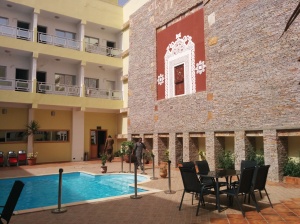POET’S PROFILE
Oumar Ba (1921-1998) was a Mauritanian poet among the most prominent from his country. I chose him for review after visiting Mauritania a couple of months back. It is a hot, beautiful country that is the site of the capital of the Ancient Ghana empire; the empire after which my country is named. So much of West Africa’s ancient history centered around the area of present-day Mauritania and it was good to see descendants of the people who have been noted in history as among the bravest and fiercest warriors and traders. Worthy of note also is the fact that West African poetry from the region of Mauritania, Mali and Senegal has been the toast of students of African anthropology, whether of the musical or free verse. Much of the country is hot, desert Sahara but I enjoyed my short stay. There is a deeply ancient feel about Mauritania.
I usually don’t but I have taken this introduction of Oumar wholesale from Poems for the Millenium,Vol. 4: The University of California Book of North African Literature.
‘Oumar Moussa Ba was one of the major scholar-poets of Mauritania as the country and Africa generally moved out of colonialism. He was born just across the border in Senegal (in 1921) to a marabout family that had always been Mauritanian (he once humorously joked that his village was in Mauritania but its cemetery, just across the river, was in Senegal). A self-educated man who later in his life received a graduate degree from the Sorbonne, he produced an outstanding oeuvre, composed on the one hand of translations of poems, sayings and narratives from the Pulaar language (Poems peuls modernes [Nouakchott: Etudes Mauritaniennes, 1965], published in Pulaar & French] & on the other hand his own writings in French, celebrating Sahelian Africa, its crepuscular nature, its myths, & its great men (Odes saheliennes [Paris: La Pensee universelle, 1978]). He is a true precursor & the first published Mauritanian Francophone poet.’
Justice Is Done
Beaten up,
Robbed,
Hospitalized?
And the witnesses?
Many as the grains of the sand:
Kadiel is one;
Ndoulla
Ndyam Bele is one
Even the birds can testify…
But you forget that the chief
Has his son as the judge
And his son-in-law as interpreter.
REVIEW
This poem is a disdainful look at social justice in Mauritania, aptly titled ‘Justice is Done’ as if justice is really done. It is not.
Look at the first three lines: a common man is beaten up, robbed and hospitalized. He is given the most brutal of treatments but by who? We will find out soon
The misdeed was not done in the dark, because Ba tells us that the witnesses (line 4) are as ‘many as the grains of sand’ (line 5). In effect, innumerable. Everybody saw what went on; Kadiel did, Ndoulla did, Ndyam Bele did! He uses first names for the first two people, to show that they were everyday people. He uses both names for Ndyam Bele to conjour the image of a foreigner, not well known in the neighbourhood but who also stands witness. Even the birds, like overhead drones, saw it. Certainly it should be easy to get justice for the victim.
You deceive yourself if that is what you thought, says Ba. Because in the last three lines, he asks whether one forgets that the ‘chief’ (line 10, pay attention to this), has his son as the judge (line 11), and even if you need to have your complaint transcribed into the language of the courts, the chief’s son-in-law is the interpreter (line 12). You are doomed. This is the only justice you get.
The reason I said to pay attention to the use of the word ‘chief’ is because it rhymes with ‘thief’! Read that poem again, substituting thief for chief and the whole poem lights up at you. It is the handiwork of a thief to beat you, to rob you and to cause you to be hospitalized. By making this grand substitution which initially looks trivial, Oumar is escalating a trivial matter and putting his seemingly harmless poem on the corridors of power. The chief is corrupt, he is nepotic and unjust. He is the thief.
That little nuance, achieved upon translation, is the reason I selected this poem for review. I hope you enjoyed reading as I did writing. Oumar Ba is a talent undoubted.


